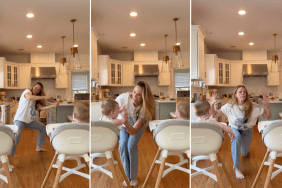I love watching my 10-year-old daughter dance. Her smile lights up the room. She moves with grace and confidence. She dances in front of large crowds without even a hint of worry lining her face. Dance makes her feel happy, confident, and calm. I recently asked her what it feels like when she’s up there on the dance floor. “It’s like everything else disappears and I’m just flying through the air. It feels happy.”
The worry lines emerge when the results come in. While she loves performing, she’s also competing. Waiting for the results can be agonizing (for both of us.) I do my best to reassure her. “I love to watch you dance,” I whisper over and over again. The results truly don’t matter to me. That my “quiet” child gets up there and exudes strength and confidence is more than enough. But the results do matter to her. She works hard, and she yearns to be recognized for that hard work. When the points aren’t in her favor, her smile fades just a little bit.
Though I secretly worry that her self-confidence might take a hit with repeated disappointments on the dance floor, it doesn’t. She knows that she can’t always win, but she also knows that she can learn from her losses. She can look at the results, make adjustments, and try again. She doesn’t let the losses define her, and her self-confidence continues to grow each time she laces up her shoes to practice. At age 10, she already knows that reaching your goals takes time and patience, and you aren’t any less of a person if you don’t meet your goal on the first attempt.
Self-confidence is something that parents need to help their kids develop overtime by giving them empathy and encouragement when they face challenges, not coaching. Want to raise a confident kid? Read on.
1. Find her own individual strengths. It might be tempting to buy soccer gear the moment your child can walk because you want to share your love of the sport with her, but it’s important to allow a child the freedom to find and hone her own strengths. Your passion is not necessarily her passion. Let your child be a child by trying all kinds of things. You don’t need an organized sport or class every season; you simply need time and presence.
2. Encourage your kid, without being controlling. Modern parenting involves a fair amount of fixing and controlling. I see more coaching from the sidelines of life (not just the field) in my office. But kids need the opportunity to try something, mess up, and try again. So, instead of coaching them through every step, provide encouragement to help them figure things out on their own.
3. Kick perfection to the curb. Some kids are natural perfectionists. They have a need to perform to the best of their ability each and every time, and they don’t like the thought of coming up short (even on a spelling test). To seek perfection, however, is to find disappointment around every corner. If your kid is a perfectionist, talk to him about how to reframe mistakes into learning opportunities and what it feels like when something doesn’t turn out as planned so that he understands that it’s natural feel upset or disappointed. When kids learn that they won’t break every time they bend, they gain the confidence to keep trying.
4. Teach her to be resilient. Resilient kids learn to work through the hard stuff and to use creative problem solving strategies to overcome obstacles. Kids hear a lot of things like, “Shake it off! You’re fine!” However, these statements are often internalized as hurtful. To focus on building resilience do this, instead:
- Show your child that you understand the problem.
- Take a break together to hit the reset button.
- Reframe obstacles as challenges to overcome.
- Encourage your child to try again.
5. Help him break tasks into small steps. A great way to build confidence is to break new tasks into manageable pieces and start small. A child who wants to learn to play the piano, for instance, isn’t likely to learn to read music in one day. The first step is to learn to identify the notes. Breaking down tasks helps kids learn to take their time and master one small step at a time. When they do this, their self-confidence increases as they learn and grow.
6. Support healthy risks. The single best thing you can do to help your child gain self-confidence is provide the time and space for healthy risk taking. When kids learn to push themselves to their limits, they feel confident. Let her climb a tree. Try a dance class. Learn an instrument or paint with oil-based paints. Healthy risks are everywhere; all we have to do is let our children take them.
7. Model positive self-talk for him. Are you an “I can” or “I can’t” kind of person? The answer to that simple question is more important than you might think. Kids take their cues from their parents. If you tend to throw in the towel quickly and make negative self-statements about your abilities, your kids will learn to do the same.
Reframe your own thoughts and use positive self-talk (yes, out in the open) to work your way through difficult tasks. A great way to do this is to create positive mantras such as, “When I try, I learn.” This shows your kids that tapping into your self-confidence will get you through the difficult obstacles that life sometimes offers.
8. Give her time to play. Kids today are play deprived, and their self-confidence suffers because of it. Play is not a luxury to be handed out only when time allows. Play is important work in the life of a child. Play is how kids find their strengths, build passion, learn to problem-solve and work through struggles. Play is the path to self-confidence.
It’s important for kids to have self-confidence. Self-confident kids perform better in school, are more likely to engage in healthy risk taking (like trying a new sport), are more assertive, and enjoy reciprocal friendships.
Self-confidence doesn’t emerge overnight, and it tends to ebb and flow as kids grow. Many parents are baffled when their previously overly confident kids suddenly plummet and begin questioning their abilities. It’s perfectly normal for kids to experience peaks and valleys as they learn and grow. With parental encouragement and plenty of time make their own dreams come true, your kids will gain the confidence they need to travel the road ahead.
Photo: Getty









